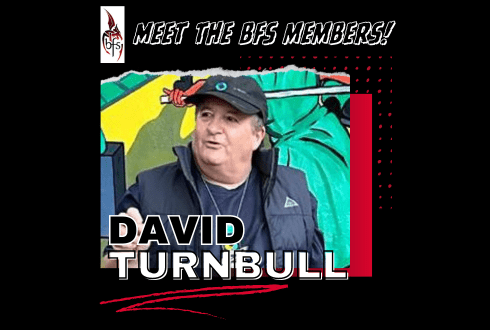Every Friday, we meet a member of the BFS and peer deep into their soul (or, at least, a form they filled out). Want to be featured? Email us: online@britishfantasysociety.org

Name, including preferred pronouns:
David Turnbull (he/him)
Which region are you based in?
London
If you write, which genre:
Sci-fi, fantasy, horror: all of the above. Sometimes a mixture of all three.
If you don’t write, what do you do?
I am also an accredited guide with the Lambeth Tour Guides Association. My tours are based on scifi, fantasy and horror and take place south of the Thames in Waterloo and other parts of Lambeth. Themes include Doctor Who, Judge Dredd, HG Wells and Sax Rohmer. I also have a blog linked to my walks called Lambeth Fantastical. I’m on a mission to get writers out from behind their desks and walking with me to explore their favourite genres while getting some exercise, fresh air and inspiration.
Are you drawn to any specific SFFH sub-genres?
I don’t know if this counts as a sub-genre, but during lockdown I became a huge fan of the Korean Scifi and Fantasy series on Netflix and other streaming services. I’d recommend the epic Alchemy of Souls, about the lives and loves of a group of mages in the fictional country of Daeho, and Kingdom, which gives an entirely new twist on the zombie genre. A recent favourite has been Gyeong Seong Creature, set during the WW2 Japanese occupation of Korea where experiments on prisoners create a pretty damned scary tentacled monster. Seeing familiar tropes through the lens of a different culture gives a fresh perspective. Another series in an entirely different genre is Song of the Bandits, set during an earlier Japanese occupation, which has a real Sergio Leone / Spaghetti Western vibe to it.
Your influences
Tell us about the book/film/thing that got you into SFFH: What was it? How old were you? What impact did it have on you?
I grew up in the 1960s and television played a huge part in getting me into SFFH. The first show that really hooked me was the Gerry Anderson supermarionation puppet series, Fireball XL5. I couldn’t get enough of the adventures of Steve Zodiac, Venus, and the rest of the crew. The theme song, I Wish I Was A Spaceman, kind of said it all for me.
(Image from IMDB)
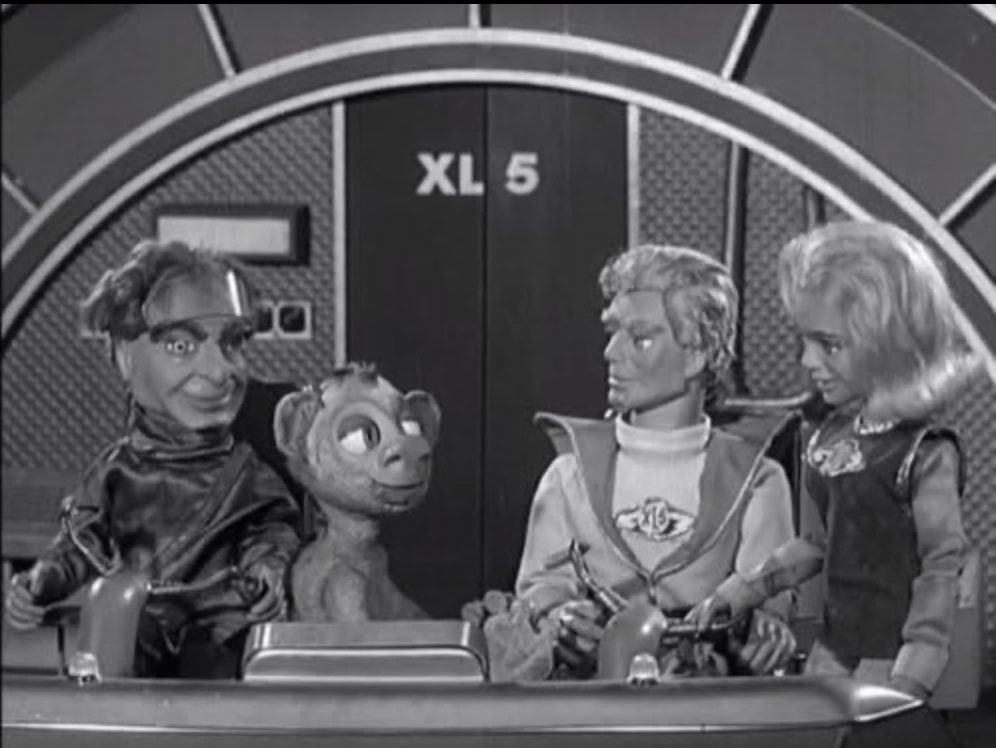
Next came Doctor Who. The first episode went out on the day my 5th birthday party was being held at my grandparents’ house.

My grandad, who’d been a huge fan of Buster Crabb’s Flash Gordon movie matinees in his youth, halted the celebrations at 5.15 so I could climb up on his lap and watch William Hartnell and Carol Ann Ford in An Unearthly Child. Saturday at 5.15 became a regular thing for us from that moment on, especially after the introduction of the Daleks.
(Still from An Unearthly Child taken from the Radio Times, © BBC)
There was also the classic American Irwin Allen shows—Voyage to the Bottom of the Sea, Time Tunnel, Lost in Space, and Land of the Giants—which I lapped up.
How does that early influence show up in your work now?
I’m sure all of that stuff endlessly seeps into my fiction writing. It’s definitely a big part of my non-fiction writing. I write quite a lot for Spooky Isles of Great Britain, and my articles usually centre around classic TV shows and movies. These, along with genre books and movies, also provide the raw material for my guided walks and Lambeth Fantastical blog.
Where do you draw your creative inspiration from?
There’s a little site on Blogspot called The Prediction, run by Sandra Davies. Each Friday she posts three random words, and the challenge is to write a piece of genre flash fiction in 100 words or less. I try to rise to the challenge every week. These little flash pieces take me in all sorts of different directions and in many cases have provided me with the raw material for short stories which have then gone on to be accepted for publication. I think over the past few years at least a dozen of my short stories started off with less than 100 words on The Prediction site. I’ve also had a collection of some of these 100 word stories (One Hundred Predictions) published by Fiction4All.
Who do you look to as a genre hero? Why?
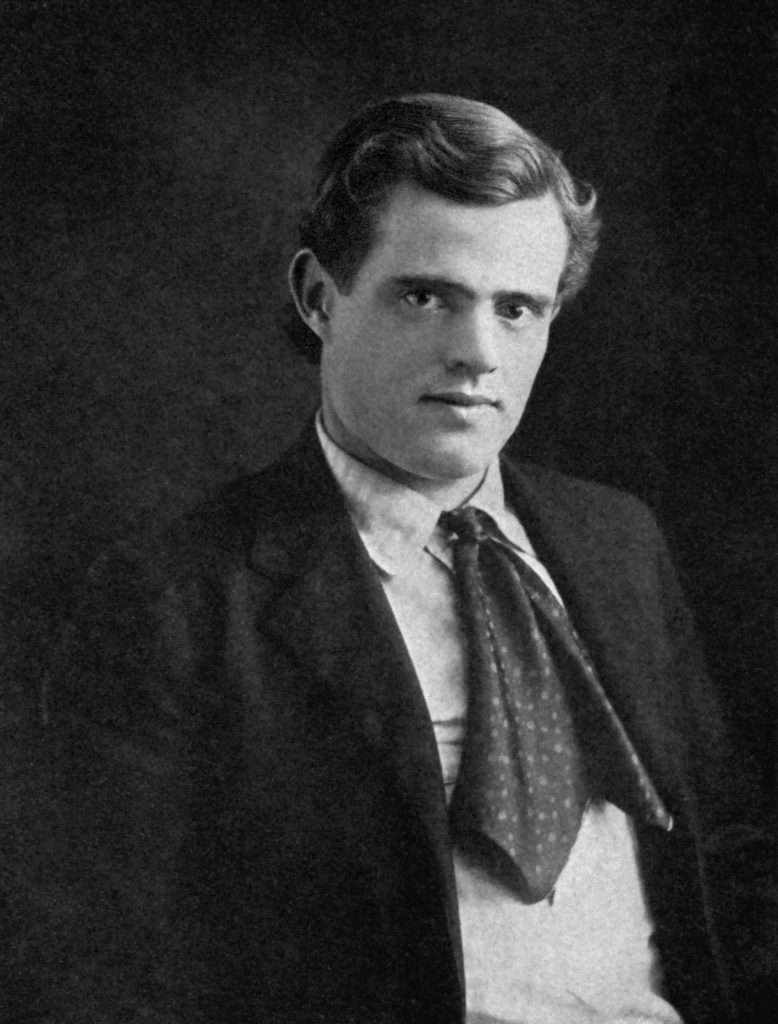
Probably Jack London. He’s not particularly known as a genre writer, but the first fiction story he sold, A Thousand Lives, was in the scifi genre. He’d had a lot of rejections up till that point and had just taken the exam for the American postal service. He was on the brink of giving up on writing and becoming a postman when this sale gave him the encouragement to keep trying. His dystopian novel The Iron Heel was inspired by HG Wells’ predictions of future societies and The Iron Heel itself was cited by George Orwell as one of the inspirations for 1984. His post-apocalyptic novella The Scarlet Plague depicts a world where the population has been decimated by a global pandemic. It predicts the role international air travel can play in the spread of disease, something we have recently witnessed with the spread of Covid.
(Photo published by L C Page and Company Boston 1903; source.)
I feel a great affinity for Jack London. Like me, he was largely self-educated and spent a lot of his early life working long hours in low paid jobs. He was a committed socialist and supporter of trade unions. I was a union activist during my time working in hotels and restaurants and a union official for over 30 years. In tribute to Jack, I have curated a guided walk focusing mainly on (The People of the Abyss) his 1902 investigation into poverty and deprivation on the streets of London, but also exploring different aspects of his fascinating and often conflicted and controversial life.
(Pictured: David in action on one of his tours)

Your work
You’re stuck in an elevator for 60 seconds with that hero, and they want you to describe your work. Give us the pitch.
My novella HUSKs is about an epidemic contained within the British Isles. As a consequence, the country is fast becoming a dystopian society, where Euthanasia Operatives are licensed to kill those who contract Hester Unwin Syndrome. Woven into the story is an impending strike called by the Operative’s Union, against a backdrop of increasing social tension and horror.
What are you working on right now?
I’ve just finished something called The Hurdy Gurdy Man, which is set in London in the late ’60s and is inspired by the Grimm fairy tale Fischer’s Bird and the Scottish borders legend of the cannibalistic Redcaps. It has a sub-plot about homelessness, which is again something Jack London had a lot to say about.
Thinking about all the stories/work you’ve done, what sticks out most in your mind? Why?
I’ve had three stories of mine read out by professional actors at the Liar’s League events in London. Also, some years back, my story A Few Minutes of Your Time was read out by former Eastenders actor, Ray Newe, at the Arachne Press Solstice Shorts Festival in Greenwich. It’s a huge thrill hearing someone read out your work to a live audience and seeing the audience reactions to his or her interpretation of a story you’ve written.
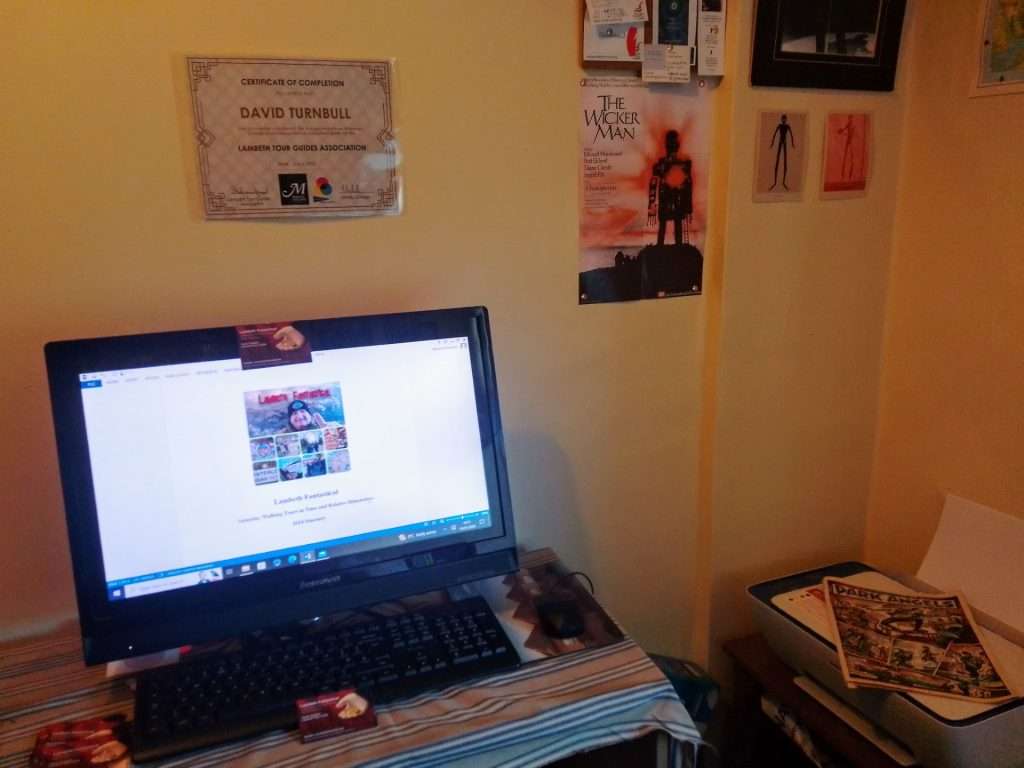
Where and when do you create/are you at your most creative?
I once read that Robert Louis Stevenson, another hero of mine, favoured writing in bed and that sounded like an extremely good idea to me. Mornings are the time I feel most creative. So, I write in bed, on a laptop, every morning from around 7.30 till 8.30 or 9.00. I usually finish stuff off on my PC at some point.
(Pictured: David’s workspace)
What’s the best advice you’ve received about creativity?
‘While our art cannot, as we wish it could, save us from wars, privation, envy, greed, old age, or death, it can revitalise us amidst it all.’ – Ray Bradbury (Zen and the Art of Writing)
What’s your writing soundtrack?
Scott Walker. His solo work in the late ’60s and early ’70s, both his self-penned stuff and his interpretations of Jacques Brel’s songs, are full of stories, colourful characters and swooping orchestral soundscapes, and all sung in the mellow tones of some psychedelic crooner.
The quickfire round
Sci-fi, fantasy or horror?
Horror
Quiet or loud?
Quiet
Dark or light?
Dark
Strict lines or genre blend?
Genre blend
Awards or bestseller?
Bestseller
Fiction or non-fiction?
Fiction
Poetry or prose?
Prose
Plotter or pantser?
Pantser
Reading or listening?
Reading
Notebook or computer?
Notebook
Favourite SFFH book of all time?
Something Wicked This Way Comes, by Ray Bradbury
Last book you read?
Mischief Acts, by Zoe Gilbert
Any SFFH author on auto-buy?
Stephen King seems to bring out a new novel each year around the time of my birthday and he seems to be on my family auto-buy as their gift to me.
Favourite podcast?
London Guided Walks
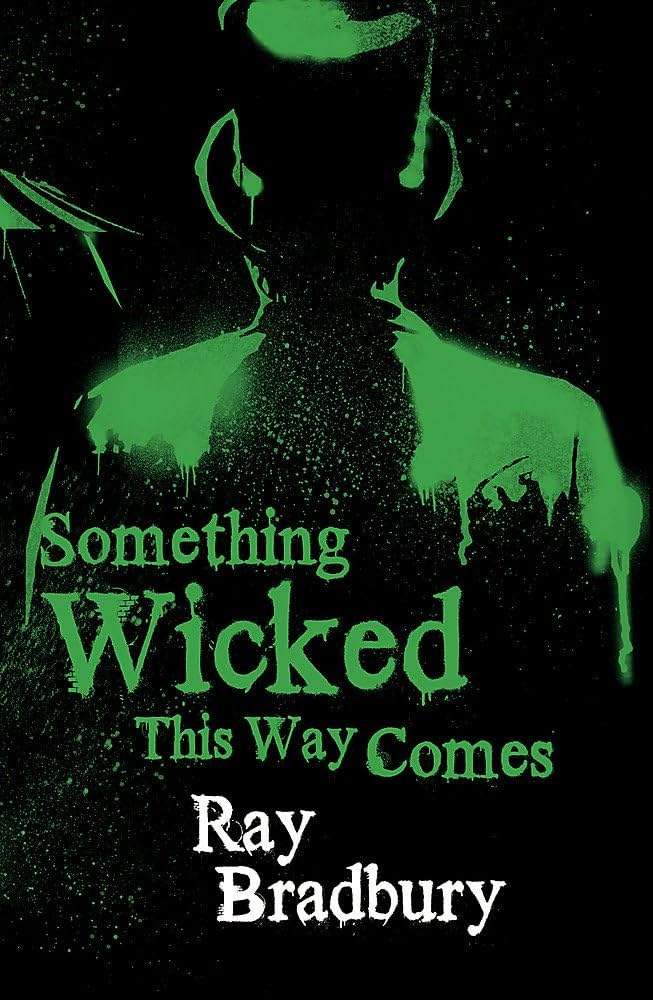
The home stretch
What’s the best thing about being involved in SFFH?
I just like letting my imagination run wild and then narrowing all of that crazy stuff down to something with characters and a plot. If it works and someone wants to publish it all the better. If someone then enjoys reading it, even better.
Time to plug your stuff! Where can we find you and your work? What have you got coming up? Consider this your advertising space.
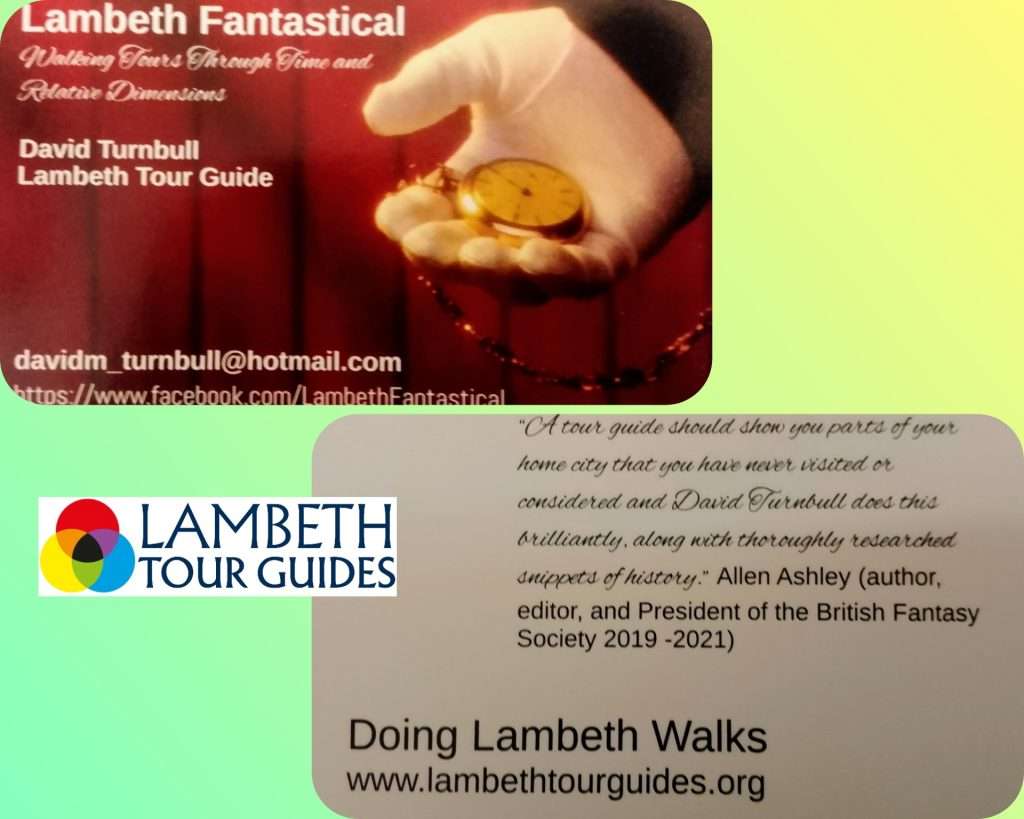
- I’ve just had a short story accepted for the Black Beacon Book of Ghost Stories due to come out later in the year and I had a story in a recent issue of online magazine Sein und Werden.
- You’ll find the Lambeth Fantastical blog here.
- I do a 90 minute Lambeth Fantastical guided walk at midday on the last Saturday of each month. Recent walks have been themed around Judge Dread in Waterloo, and Attack the Block / Defend the Estate around Oval tube station.
- You can keep up to date with my guided walks on my Lambeth Fantastical Facebook page, or follow me on Eventbrite.
I’m also about to launch a series of summer evening walks Called Lambeth Fantastical: Into the Twighlight Zone. Get the details here.
Also, my longer fiction works can be found at the following links:

